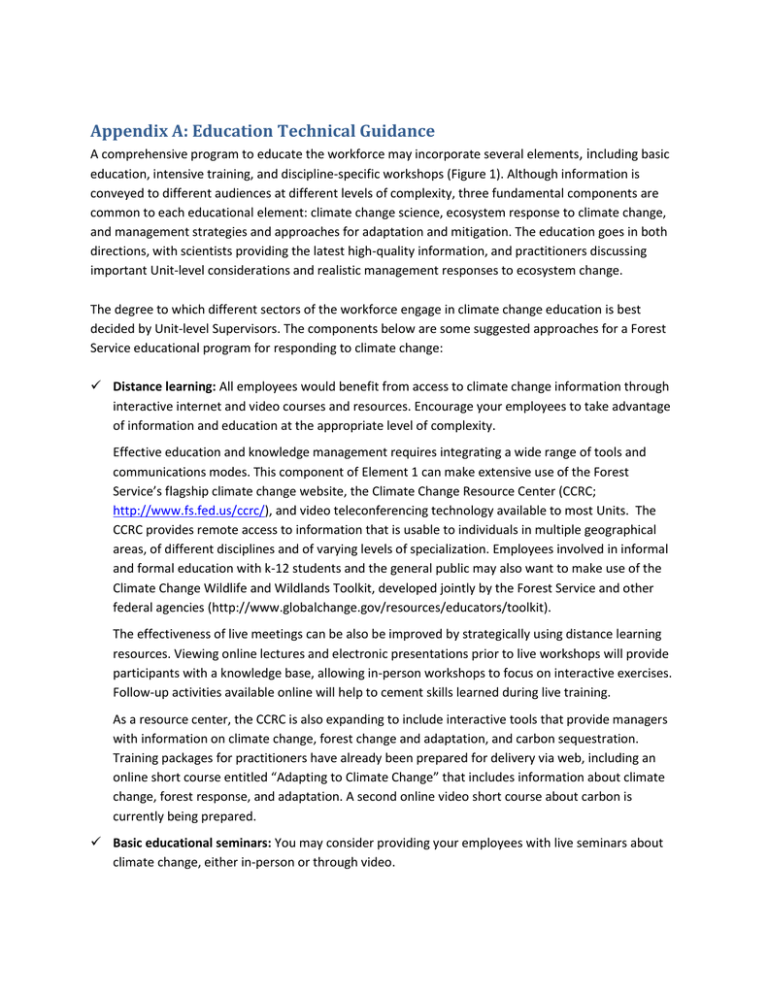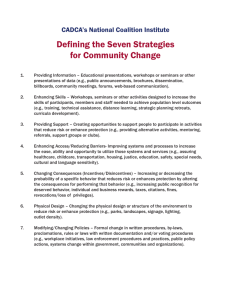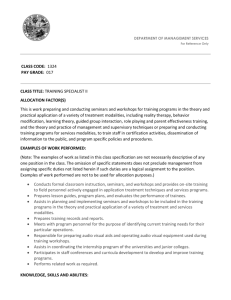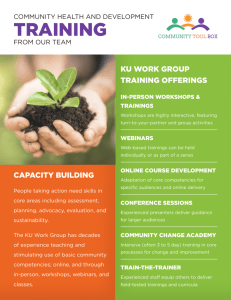Appendix A: Education Technical Guidance , in
advertisement

Appendix A: Education Technical Guidance A comprehensive program to educate the workforce may incorporate several elements, including basic education, intensive training, and discipline-specific workshops (Figure 1). Although information is conveyed to different audiences at different levels of complexity, three fundamental components are common to each educational element: climate change science, ecosystem response to climate change, and management strategies and approaches for adaptation and mitigation. The education goes in both directions, with scientists providing the latest high-quality information, and practitioners discussing important Unit-level considerations and realistic management responses to ecosystem change. The degree to which different sectors of the workforce engage in climate change education is best decided by Unit-level Supervisors. The components below are some suggested approaches for a Forest Service educational program for responding to climate change: Distance learning: All employees would benefit from access to climate change information through interactive internet and video courses and resources. Encourage your employees to take advantage of information and education at the appropriate level of complexity. Effective education and knowledge management requires integrating a wide range of tools and communications modes. This component of Element 1 can make extensive use of the Forest Service’s flagship climate change website, the Climate Change Resource Center (CCRC; http://www.fs.fed.us/ccrc/), and video teleconferencing technology available to most Units. The CCRC provides remote access to information that is usable to individuals in multiple geographical areas, of different disciplines and of varying levels of specialization. Employees involved in informal and formal education with k-12 students and the general public may also want to make use of the Climate Change Wildlife and Wildlands Toolkit, developed jointly by the Forest Service and other federal agencies (http://www.globalchange.gov/resources/educators/toolkit). The effectiveness of live meetings can be also be improved by strategically using distance learning resources. Viewing online lectures and electronic presentations prior to live workshops will provide participants with a knowledge base, allowing in-person workshops to focus on interactive exercises. Follow-up activities available online will help to cement skills learned during live training. As a resource center, the CCRC is also expanding to include interactive tools that provide managers with information on climate change, forest change and adaptation, and carbon sequestration. Training packages for practitioners have already been prepared for delivery via web, including an online short course entitled “Adapting to Climate Change” that includes information about climate change, forest response, and adaptation. A second online video short course about carbon is currently being prepared. Basic educational seminars: You may consider providing your employees with live seminars about climate change, either in-person or through video. Basic educational seminars are intended to convey fundamental principles of climate change and the effects of climate change on forested ecosystems and to generate discussion of how Forest or resource areas can adapt to projected changes. This component is characterized by one- to two-day seminars in which the first half day is largely comprised of presentations on climate change, forest response, and management strategies. The remainder is tailored specifically to the needs of the host Forest. Needs range from general brainstorming and discussion to creating lists of potential activities that can take place at the Forest and project level. The role of the seminar facilitators is largely to answer specific questions where possible, provide continuity by sharing ideas from previous seminars from other Forests, and maintain a dialogue focused on climate change activities. These seminars may be used to set the stage for “next steps”, in which plans for further training, activities, or intra-Unit discussion are initiated. Intensive training: Weeklong, in-person courses that provide in-depth information about climate change, ecosystem response, and adaptation may be appropriate for climate change coordinators, line officers, staff officers, and employees that have technical expertise in natural resource management. DisciplineSpecific Training Targeted Workshops Specialists Intensive Training Specialists Basic Educational Seminars Land Managers General Audience Intensive training includes weeklong courses providing much more in-depth information than that provided in seminars. Some Regions and Stations are already developing these courses for Unit-level staff, and these courses may be particularly beneficial to climate change coordinators. Courses typically include both pre-work and a final project to be concluded within the participants’ Forests or Grasslands. The intensive training moves beyond a simple overview of climate change, providing participants with a detailed explanation of fundamental climate processes and interactions and how human impacts affect them. Additionally, much greater detail on ecosystem response to climate stressors is typically presented and discussed. Tools and applications relevant to carbon and climate are often presented in a computer lab setting in the presence of experienced instructors. Participants are given the opportunity to evaluate issues or resources in their own Forests using these tools. An emphasis is placed on the Distance Learning Increasing Specialization and Adaptation Design Figure 1. Conceptual diagram of educational and training efforts leading to increased complexity of adaptation planning and activities. These elements are integrated, but need not be taken consecutively. Distance learning can be incorporated into all activities. strengths and limitations of the tools for management-related decision-making. Final projects may vary in nature according to participant needs. Discipline-specific training: Encourage resource managers and other technical experts to attend inperson workshops that provide in-depth information and discussion about the interaction of climate change with specific discipline areas (e.g., silviculture, fish biology, and hydrology). Discipline-specific trainings allow for focused presentation and discussion of climate change implications for specific resource areas. Although much of the information on climate change science, forest response, and management strategies described for the above educational approaches is also included in these trainings, the information most relevant to particular resource areas is emphasized. Additionally, this type of training is comprised of activities designed to draw upon participant expertise and interest. Examples of discipline-specific trainings include two-day regional silvicultural workshops given by NRS/R9 and PNW/R6, and an aquatic tools workshop hosted by RMRS for western Regions. These workshops incorporated scientific presentations on climate change impacts on forest ecosystems, brainstorming sessions on discipline-specific considerations for climate change, and breakout sessions to discuss strategies and local approaches and tools. Targeted workshops: Encourage your resource managers to work closely with researchers through combined in-person and video-linked workshops to address specific issues, resources, and locations. Targeted workshops will most heavily draw upon the skills of land managers with the intent of designing or altering techniques and programs to incorporate climate change considerations. These workshops will also likely involve the closest collaboration between researchers and managers, as the basic questions addressed require both mission areas: “What do we know now that requires us to change our actions?”, and “How can we practically change our actions to meet the changing needs?” As climate change challenges become more clearly identified, targeted workshops will be critical tools in pooling expertise to meet very specific needs of land managers and focus on specific issues, resources, and locations. The structure of individual workshops will depend upon management objectives and desired outcomes; they will likely include little focus on traditional educational models, and much greater focus on shared learning through detailed technical discussion within the context of a range of climate projections and impacts.





